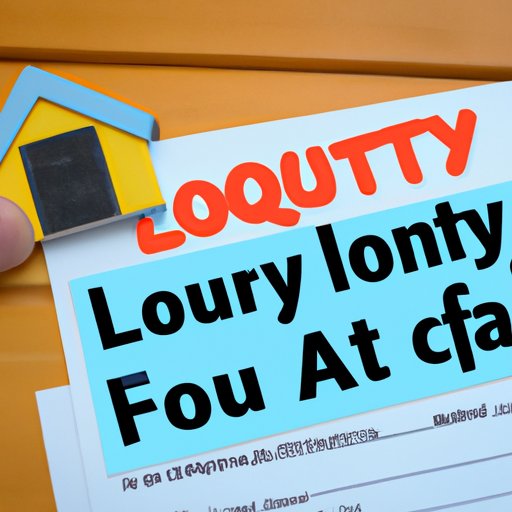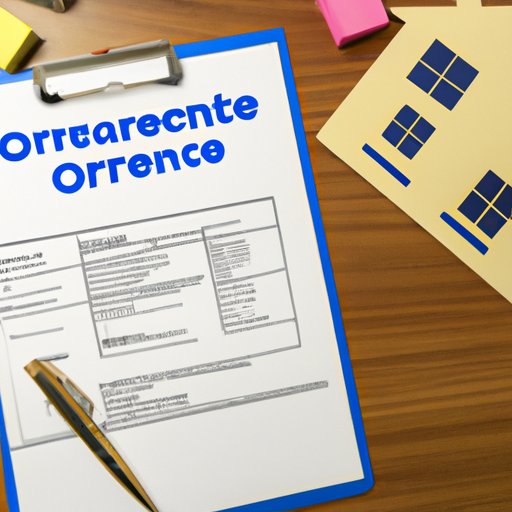Introduction
Owner financing is an agreement between a buyer and a seller in which the seller finances all or part of the purchase price. This type of arrangement is often used when a buyer cannot obtain conventional financing from a bank or other financial institution due to lack of credit history or inability to meet the requirements for a loan. While owner financing can be beneficial for both parties involved, it can also become difficult to manage if circumstances change. If you find yourself in a situation where you need to get out of an owner finance contract, there are several options available.
Overview of Owner Finance Contracts
In an owner finance contract, the seller agrees to act as the lender and provide the financing for the purchase of the property. The buyer agrees to make monthly payments to the seller, usually with interest, until the balance of the loan is paid off. These types of contracts are typically secured by the property itself, meaning that if the buyer fails to make payments, the seller has the right to take possession of the property. In certain cases, the seller may require additional security such as a promissory note or a lien on the buyer’s other assets.
Purpose of Article
This article will explore the different options available for getting out of an owner finance contract. We will discuss ways to negotiate a buyout with the current owner, refinance the loan with a traditional lender, seek out a third-party investor to buy out the contract, sell the property and use the proceeds to pay off the remaining balance, take out a personal or home equity loan to pay off the contract, and explore other options such as a short sale or loan modification.

Negotiate Buyout of Contract with Current Owner
One option for getting out of an owner finance contract is to negotiate a buyout with the current owner. This option requires that you have the financial means to pay off the remaining balance of the loan in full. To begin, you should identify the terms of the contract, including the amount owed, the interest rate, and the length of time remaining on the loan. You should also consider your financial situation and ability to pay off the balance in full. Once you have determined that you have the means to pay off the loan, you can begin negotiations with the current owner.
It is important to remember that the current owner is under no obligation to accept any offer you make. They may be willing to negotiate a settlement agreement that is mutually beneficial for both parties. For example, they may agree to reduce the amount owed or extend the repayment period in exchange for a lump sum payment. It is important to get any agreement in writing to avoid any misunderstandings down the road.

Refinance Loan with Traditional Lender
Another option for getting out of an owner finance contract is to refinance the loan with a traditional lender. This option requires that you have good credit and a stable income. To begin, you will need to gather the necessary documentation such as tax returns, bank statements, and proof of income. You will then need to shop around for the best interest rate and close on the refinanced loan.
When refinancing, it is important to pay attention to the fees associated with the loan. You may be required to pay closing costs, appraisal fees, and other fees associated with the loan. Make sure you understand all of the costs associated with the loan before signing any documents.
Seek Out Third-Party Investor to Buy Out Contract
If you do not have the financial means to buy out the contract yourself, you may be able to find a third-party investor to buy out the contract. To begin, you should research investors in your area who may be interested in purchasing owner finance contracts. You can reach out to potential investors and negotiate an agreement that is beneficial for both parties.
When seeking out an investor, it is important to keep in mind that they may require additional security such as a lien on your other assets or a promissory note. Additionally, they may charge a fee for their services. Make sure you understand the terms of any agreement before signing anything.
Sell Property and Use Proceeds to Pay Off Remaining Balance
If you do not have the means to pay off the loan in full, you may be able to sell the property and use the proceeds to pay off the remaining balance. To begin, you will need to prepare the property for sale by making any necessary repairs or upgrades. You will then need to market the property and find a buyer who is willing to purchase the property for the amount you owe on the loan.
When selling the property, it is important to keep in mind that you may be responsible for paying any closing costs associated with the sale. Additionally, you will need to factor in any real estate agent commissions. Make sure you understand the costs associated with the sale before entering into any agreements.

Take Out Personal or Home Equity Loan to Pay Off Contract
If you do not have the means to pay off the loan in full, you may be able to take out a personal or home equity loan to pay off the remaining balance. To begin, you will need to calculate the amount needed to pay off the contract. You will then need to shop around for the best interest rate and close on the loan.
When taking out a loan, it is important to remember that you may be required to pay additional fees such as closing costs and appraisal fees. Additionally, you may be responsible for paying points or other upfront fees. Make sure you understand all of the fees associated with the loan before signing any documents.
File for Bankruptcy to Discharge Debt
If you are unable to pay off the loan in full, you may be able to file for bankruptcy to discharge the debt. To begin, you will need to understand the options for Chapter 7 or 13 bankruptcy. You will then need to gather the necessary documentation such as bank statements and proof of income. Finally, you will need to file for bankruptcy.
It is important to remember that filing for bankruptcy is a serious matter and should not be taken lightly. Additionally, filing for bankruptcy can have a negative effect on your credit score and may limit your ability to obtain future financing. Make sure you understand the consequences of filing for bankruptcy before making any decisions.
Explore Other Options
In addition to the options discussed above, there are other options available for getting out of an owner finance contract. These include a short sale, deed in lieu of foreclosure, or loan modification. A short sale involves selling the property for less than the amount owed on the loan and using the proceeds to pay off the remaining balance. A deed in lieu of foreclosure allows the borrower to transfer ownership of the property back to the lender in exchange for releasing the borrower from the debt. A loan modification involves renegotiating the terms of the loan such as the interest rate or repayment period.
Conclusion
Getting out of an owner finance contract can be difficult, but there are several options available. You can negotiate a buyout with the current owner, refinance the loan with a traditional lender, seek out a third-party investor to buy out the contract, sell the property and use the proceeds to pay off the remaining balance, take out a personal or home equity loan to pay off the contract, or explore other options such as a short sale or loan modification. Ultimately, it is important to carefully consider your financial situation and the available options before making any decisions.
(Note: Is this article not meeting your expectations? Do you have knowledge or insights to share? Unlock new opportunities and expand your reach by joining our authors team. Click Registration to join us and share your expertise with our readers.)
